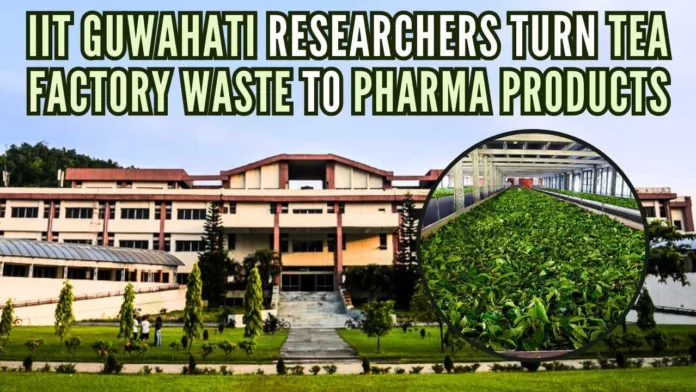
IIT Guwahati turns tea waste into valuable products
Researchers at the Indian Institute of Technology (IIT) Guwahati have developed innovative technologies to create pharmaceutical and food products from waste coming out of tea factories.
As per a recent study, world tea consumption reached 6.3 million tonnes and is expected to rise to 7.4 million tonnes by 2025. This huge tea consumption leads to an increase in industrial tea waste generation.
Because of its high lignin (complex organic polymers) and low inorganic content, efficient utilization of tea industry wastes demands scientifically advanced techniques.
The range of innovative value-added products developed at IIT Guwahati laboratory include low-cost antioxidant-rich supplements for a healthier lifestyle, organic preservatives to redefine food preservation, pharmaceutical super-grade activated carbon, biochar for waste reduction and environmental restoration including carbon sequestration, liquefiable carbon source for innovative solutions for medicine, micro and nano-crystalline cellulose for intelligent packaging and carbon quantum dots for detecting harmful contaminants in water bodies.
The research team has also filed multiple patents based on these developments.
“The convenience and health benefits of catechin-based capsules open a promising avenue, offering users access to the advantages of catechins without the necessity of multiple cups of green tea. This caters to the increasing demand for antioxidant-rich supplements in our daily routines,” said Prof. Mihir Kumar Purkait, Department of Chemical Engineering, IIT Guwahati, in a statement.
“The lignin-rich spent tea leaves are transformed into activated carbon through a specialized reactor,” said Purkait.
The developed technologies harness the potential of tea waste, creating new revenue streams within the local tea industry.
The tea industry’s waste-based value-added products will also create new job opportunities and open wind of new start-ups and entrepreneurship opportunities among the rural youths, the researchers said.
Their findings have been published in various international journals including the International Journal of Biological Macromolecules, Chemosphere, Critical Reviews in Biotechnology, etc.
[With Inputs from IANS]
For all the latest updates, download PGurus App.
- BJP drops 2-term sitting MP Poonam Mahajan; fields 26/11 counsel Ujjwal Nikam from Mumbai North Central - April 27, 2024
- RBI sets criteria for Small Finance Banks seeking Universal Banks license - April 27, 2024
- 16 Indian crew members on seized cargo ship to be released soon: Iran Foreign Minister - April 27, 2024










